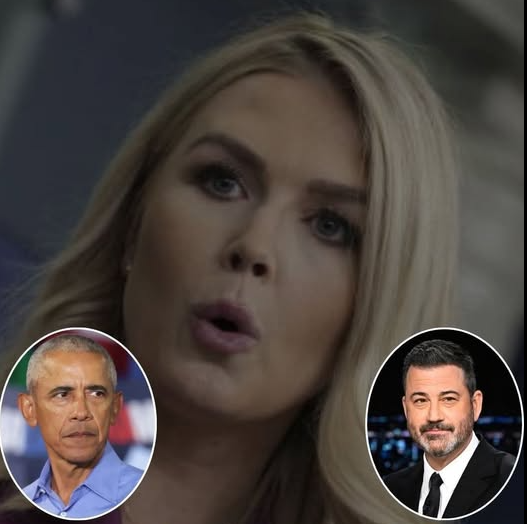White House press secretary Karoline Leavitt appeared as a featured guest on Kayleigh McEnany’s newly launched Fox News program Saturday in America, where she directly addressed former President Barack Obama’s sharp criticism regarding the indefinite suspension of Jimmy Kimmel Live. The issue, which has quickly become a flashpoint in both political and media circles, has ignited heated debate over cancel culture, press freedom, and corporate accountability.
Obama, in a strongly worded post on X this past Thursday, accused the current administration of crossing a dangerous line. He argued that by threatening media companies with potential regulatory repercussions unless they silence or terminate commentators the administration disapproves of, the White House has ventured into unconstitutional territory. “After years of complaining about cancel culture, the current administration has taken it to a new and dangerous level by routinely threatening regulatory action against media companies unless they muzzle or fire reporters and commentators it doesn’t like,” Obama wrote. He further insisted: “This is precisely the kind of government coercion that the First Amendment was designed to prevent — and media companies need to start standing up rather than capitulating to it.” His words reverberated across the media landscape, sparking concern among free-speech advocates and critics of government overreach.
Leavitt, however, dismissed Obama’s accusations outright during her interview with McEnany. With a firm and unapologetic tone, she called the former president’s statement both misleading and uninformed. “With all due respect to former President Obama, he has no idea what he’s talking about,” Leavitt said, stressing that the decision to cancel Jimmy Kimmel’s late-night program was not made by the government but rather by executives at ABC. According to her, the network reached its conclusion independently, without any directive or interference from President Donald Trump or his administration.
To reinforce her point, Leavitt shared a personal anecdote. She explained that she herself was the one who informed Trump of the news while they were abroad. “And how do I know that, Kayleigh?” she asked rhetorically. “Because I was with the President when this news broke in the United Kingdom. I was the one who told him, and at that time he had absolutely no knowledge that ABC had taken such an action.” Her remarks aimed to undermine the credibility of Obama’s accusations by highlighting the timeline and circumstances surrounding the show’s suspension.
Leavitt then went further, defending the decision made by ABC executives as a response to what she described as Kimmel’s breach of journalistic trust. “It was a decision that was made by ABC because Jimmy Kimmel chose to knowingly lie to his audience on his program about the death of a highly respected man when our country is in a state of mourning,” she argued. “That was a decision he made, and he is now facing the consequence for that decision and for that lie.” Her comments framed the suspension not as political censorship, but as corporate accountability in response to public trust being violated.
The controversy stems from remarks Kimmel made about Charlie Kirk’s alleged assassin, comments that quickly triggered backlash across conservative media and political circles. Disney, the parent company of ABC, confirmed to Fox News Digital on Wednesday that Jimmy Kimmel Live, filmed in Los Angeles, has been suspended “indefinitely.” The ripple effects spread rapidly: Nexstar Media Group, which owns hundreds of local television stations nationwide, announced that it would preempt the program on all of its ABC affiliates “for the foreseeable future,” citing Kimmel’s inappropriate remarks. Similarly, Sinclair Broadcast Group, another major broadcaster, also confirmed it would pull the show from its lineup.
For now, the debate rages on. Supporters of Obama argue that the timing and nature of the suspension strongly suggest political influence, while the White House insists that it had no role in ABC’s internal decisions. Meanwhile, the media industry is left grappling with broader questions: to what extent should networks hold their hosts accountable for on-air remarks, and where does the line between corporate responsibility and political censorship truly lie?
